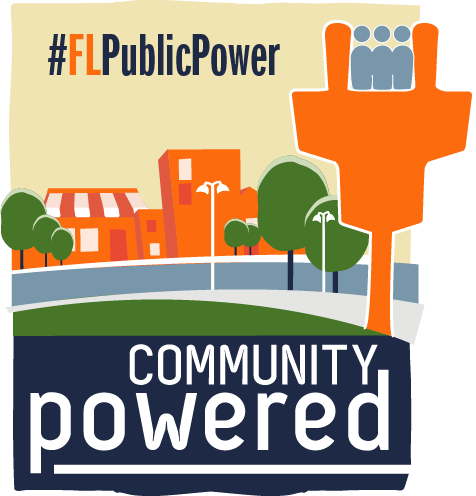Women’s History Month: Q&A with Milvia Hidalgo, Planning Engineer at Gainesville Regional Utilities
 As part of Women’s History Month, we celebrate the valuable contributions women have made in many fields, including the electric industry.
As part of Women’s History Month, we celebrate the valuable contributions women have made in many fields, including the electric industry.
Milvia Hidalgo, standing second from left here with colleagues at Gainesville Regional Utilities (GRU), is an example of how tenacious persistence makes all the difference in life. Learn more about her can-do attitude in this conversation.
MH: I went to high school in Miami and then started at the University of Florida at age 17. I was extremely lucky to get accepted to UF; I’m the first one in my family to go to any college! I graduated in three years with a business administration degree but graduated during the minor recession of 2002. I had no contacts and jobs were hard to find. The only people I knew who got job offers at that time were my roommates, and they were engineering students. So I enrolled again at the University of Florida and got a bachelor’s degree in electrical engineering.
FMEA: That was a very practical reason to pursue an engineering degree, focusing on career opportunities. Did you click with the curriculum, which I guess would help you stick with it and be successful?
MH: I think it was more about proving to myself that I could do it. You have to be persistent to handle the engineering curriculum at the University of Florida. I’ve learned some people genuinely are wired to be engineers — it comes naturally to them — others have to develop the skills to think like an engineer.
An engineering degree is great because it teaches you structured thinking, and not everyone is lucky to grow up with that mindset. Math teaches you to think in a very logical, methodical and sequential way. I believe you can develop that skillset by taking all those rigorous courses.
FMEA: You were successful because of your persistence.
MH: To some extent, yes, and God bless the University of Florida. The College of Engineering has such a great reputation that I was able to obtain an internship at an energy company in the Carolinas, and that experience opened the door for me to get my position at GRU. I was lucky to come back home to Florida because these positions don’t open up very often. Now, I’ve been working at GRU for more than 12 years.
FMEA: What are your main duties there?
MH: I mostly fulfill transmission planning tasks for compliance with national electric standards. I’ve been fortunate to be exposed to all different aspects of the utility, such as Transmission & Generation Operations, Distribution Operations, customer service, electric and gas metering. And if a storm hits, everyone is called on to do storm work.
FMEA: What type of work are you doing in the field?
MH: During storms, damage assessment. If a feeder line is down, for instance, we help in determining what equipment is needed to fix it and getting an estimate of the necessary materials and labor required. The assessment data helps leadership decide whether GRU needs to call for mutual aid and helps estimate how long storm recovery would take.
FMEA: What sources of information or inspiration have contributed to your success?
MH: As far as books go, “Problem Solved” by Cheryl Einhorn is excellent. I’m pushing to have my 11-year-old read it with me.
And a person who inspires me right now is Elon Musk. He’s a great engineer and even better marketer. Historical persons who made me realize what true “genius” is: James Maxwell — Maxwell’s Equations in the 1800s are the basis for the world we currently live in, in terms of electricity, and of course, Nikola Tesla. I firmly believe respect must be bestowed to those who truly move humanity forward.
FMEA: What’s the message you’d offer students, maybe in high school, who are looking to the future but not sure what kind of job is right for them based on their own skills and interests?
MH: Take courses that encourage critical and/or structured thinking. Learn to think critically and then be pragmatic in your job choices. Prepare yourself to succeed in a job that the market needs and will pay for.
 Enter your email address in the
Enter your email address in the 